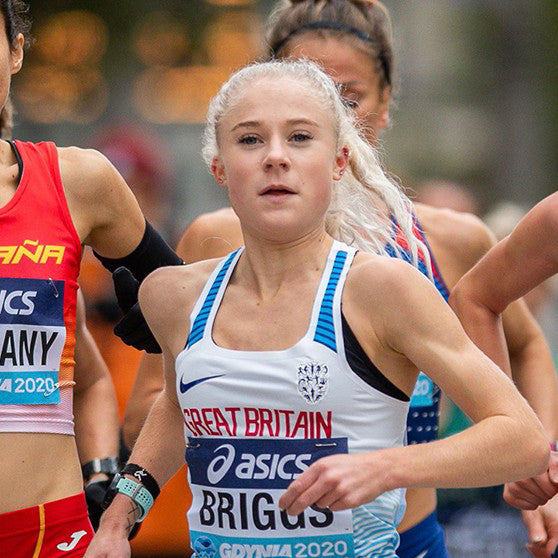Athletes have an increased risk of eating disorders, given the strong narrative around nutrition and the impact it can have on performance.
More and more people at all levels are starting to speak up about problems they’ve faced around food, so our understanding and awareness of the issue is growing.
British distance runner Becky Briggs is the latest to voice her struggles.
At just 22 years of age, Briggs has already run the 20th fastest marathon time in British history, clocking 2.29.06 at the Therme Manchester Marathon in April 2020. She’s an athlete who immediately stands out when she competes, always showing fierce determination at the back end of races and standing at only around five feet tall in height.
That performance in Manchester earned her a call up to the GB squad for the European Championships in Munich next August.
An emotional Briggs broke down in tears at the finish line after the race of her career so far.
“The marathon at Manchester meant so much because if I could go back and tell a 12-year-old me sat in hospital, when I wasn’t even allowed to walk or leave the seat let alone being able to run, then I would say that getting back into a healthy mindset is so worth it,” Briggs told
Athletics Weekly.“Just because something has gone wrong in your life or if you’ve had a few bad years it doesn’t mean that life is over and there’s so much ahead for you.
“I suffered from an eating disorder that was so based on running and not my self-image. It was all to do with not feeling good enough and to have that at such a young age – at Year 8 in secondary school – and being plagued by that for the next 5/6 years, taught me a lot about myself as a person.
“When you are at complete rock bottom and to be able to bring yourself back up gives you a lot of mental strength. Honestly, it’s one of the biggest factors to where I am now, especially in the marathon where you can do all the training you want but it’s so much more about mindset.”
Before even becoming a teenager, Briggs was hospitalised in an NHS inpatient unit due to her eating disorder. There, she was closely monitored and had a lot of basic freedoms taken away in circumstances she describes as “frankly appalling”.
A big part of the problem was that there wasn’t enough thought on the problem stemming from mental health rather than physical health.
“That’s why I struggled for so many years afterwards,” she added. “I managed to get myself out of hospital but nothing had changed in my mind.
“I had absolutely everything taken away from me including no contact with friends or family. I had no control over what I did during the day so to even be able to go for a walk outside or eat whatever now and make that decision is such a difference. When you’ve had everything taken away from you, there’s an appreciation for the things you get back so much more.
“The amount of messages [after the Therme Manchester Marathon] that I had from people, some who I wasn’t really in contact with anymore, was amazing. Some saw me really struggling and disappearing from school for a few months so to come back looking like a different person meant the most. They now see that I’ve actually done quite well and I could’ve given up at a younger age but I’m really glad I stuck at it and do what I love.”


Share:
How A High-Fibre Diet Can Improve Recovery
How To Wake Up Your Body To Improve Your Morning Workout